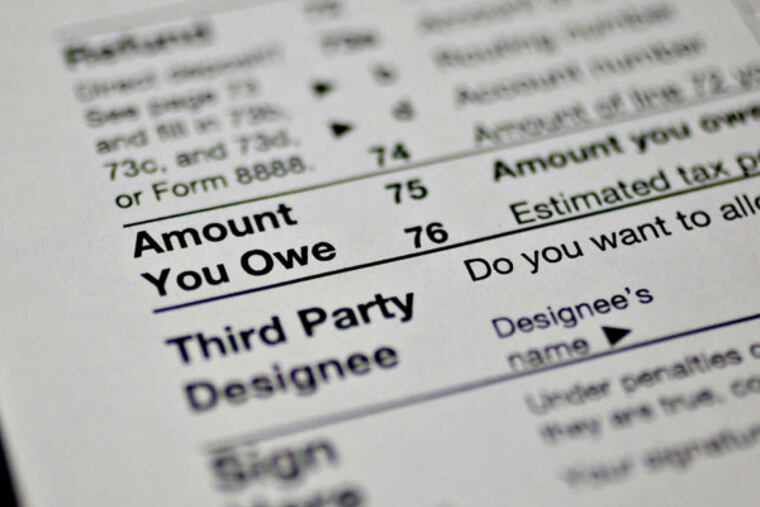Don't be fooled - a tax bite looms
WASHINGTON - Workers probably won't feel the full brunt of next year's tax increases in their January paychecks, but don't be fooled by the temporary reprieve.

WASHINGTON - Workers probably won't feel the full brunt of next year's tax increases in their January paychecks, but don't be fooled by the temporary reprieve.
No matter what Congress does to address the year-end fiscal cliff, it's already too late for employers to accurately withhold income taxes from January paychecks, unless all the current tax rates remain unchanged, which is unlikely.
Social Security payroll taxes are set to increase on Jan. 1, so workers should immediately feel the squeeze of a 2 percent cut in their take-home pay. But as talks drag on over how to address other year-end tax increases, the Internal Revenue Service has delayed releasing income tax withholding tables for 2013.
As a result, employers are planning to withhold income taxes at the 2012 rates, at least for the first one or two paychecks of the year, said Michael O'Toole of the American Payroll Association.
If employers don't withhold enough taxes in January, they will have to withhold even more taxes later in the year to make up the difference. Otherwise, taxpayers could get hit with big tax bills, and possibly penalties, when they file their 2013 returns.
The tax increases could be steep. If Congress fails to act, workers at every income level face significant tax increases next year as part of the year-end fiscal cliff.
A taxpayer making between $50,000 and $75,000 would get an average tax increase of $2,400, according to the Tax Policy Center, a Washington research group. If the worker is paid every two weeks, that's about $92 a paycheck, on average.
Someone making between $75,000 and $100,000 would get a tax increase averaging nearly $3,700. If the worker is paid every two weeks, that's about $142 a paycheck.
O'Toole said it would take most employers two weeks to four weeks to update their payroll systems, once new tax withholding tables are released. For some small businesses, it could take longer.
On Friday, the IRS said it planned to issue guidance by the end the year, though that will be too late to affect paychecks in early January.
About three-quarters of taxpayers got tax refunds this year, averaging $2,707, according to the IRS. That gives most taxpayers some leeway to manage their income tax withholding. But many people rely on tax refunds to pay bills or make major purchases.
Most of the expiring tax breaks were first enacted under President George W. Bush and extended under President Obama. Obama campaigned for reelection on extending the tax cuts on incomes below $200,000 for individuals and $250,000 for married couples. Obama would let the tax cuts expire on incomes above those amounts.
In negotiations with House Speaker John Boehner, Obama offered to raise the income threshold, limiting tax increases to those making more than $400,000. Boehner, who has argued for years that the tax cuts should be made permanent for everyone, responded by trying to push a bill through the House that would have let many of the tax cuts expire on incomes above $1 million.
Many Republicans revolted and Boehner (R., Ohio) shelved the bill, sending lawmakers home for the Christmas holiday and leaving the outcome of talks in doubt as the new year approaches.
Fiscal Cliff Tax Increases
A big package of tax cuts first enacted a decade ago is scheduled to expire at the end the year, unless Congress and the White House reach a deal to extend it. Here's how the potential tax increases would affect households.
Annual income Ave. tax Increase
$20,000 to $30,000 $1,064
$40,000 to $50,000 $1,729
$50,000 to $75,000 $2,399
$75,000 to $100,000 $3,688
$100,000 to $200,000 $6,662
$200,000 to $500,000 $14,643
$500,000 to $1 million $38,969
More than $1 million $254,637
SOURCES: Tax Policy Center, Associated PressEndText